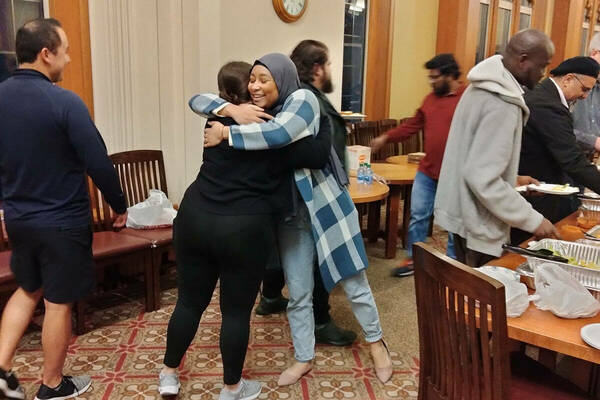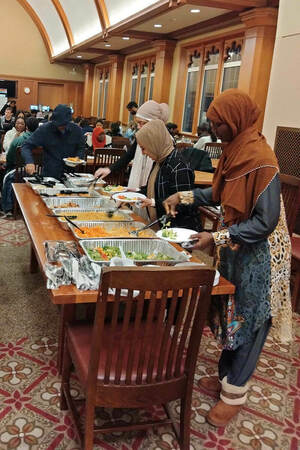
Notre Dame Law School students and members of the wider South Bend community came together on the evening of Friday, April 22, for an interfaith dinner in Eck Commons.
About 70 people from different faith backgrounds attended the dinner, which was held in observance of the Muslim holy month of Ramadan, the Jewish Passover, and Easter. Every 30 years, the three major holidays coincide for three consecutive years, so the event on April 22 was a rare opportunity to celebrate Ramadan, Passover, and Easter at the same time.
The event started at sunset, which was 8:33 p.m., with the Ramadan tradition of breaking fast taking place with dates and water at 8:36 p.m. A Muslim attendee then delivered the call to prayer, customarily performed to remind Muslims to leave worldly matters behind and come pray. Attendees of other faith traditions sat in silent recognition as Muslim attendees then went to one end of Eck Commons for the maghrib prayer, which Muslims pray at sunset each day.

Dinner featured halal food and matzo. Local spiritual leaders from each religious tradition spoke during the meal.
The University of Notre Dame’s staff chaplain, Rev. James Bracke, C.S.C., spoke about Easter. Mahan Mirza, executive director of Notre Dame’s Ansari Institute for Global Engagement with Religion, talked about Ramadan. Bob Feferman, community relations director for the Jewish Federation of St. Joseph Valley, and Rabbi Shoshana Feferman of Temple Israel in Valparaiso, Indiana, talked about Judaism and the significance of Passover.
The event was the first time Notre Dame Law School came together as a community for an interfaith dinner, but it will not be the last. The Law School will host another interfaith dinner next year when the three faith traditions will coincide for a final time before the 30-year hiatus.
“The beauty of a time when Ramadan, Passover, and Easter all coincide is that it gives us an opportunity to recognize and celebrate the inter-spiritual ties that bind these Abrahamic traditions together,” the Law School’s Director of Diversity, Equity, and Inclusion Max Gaston said. “Whether you are Jewish, Muslim, or Catholic, we are all called to a path of love, and the belief that dedication to that love is the highest expression of our faith.”
Originally published by at law.nd.edu on May 02, 2022.